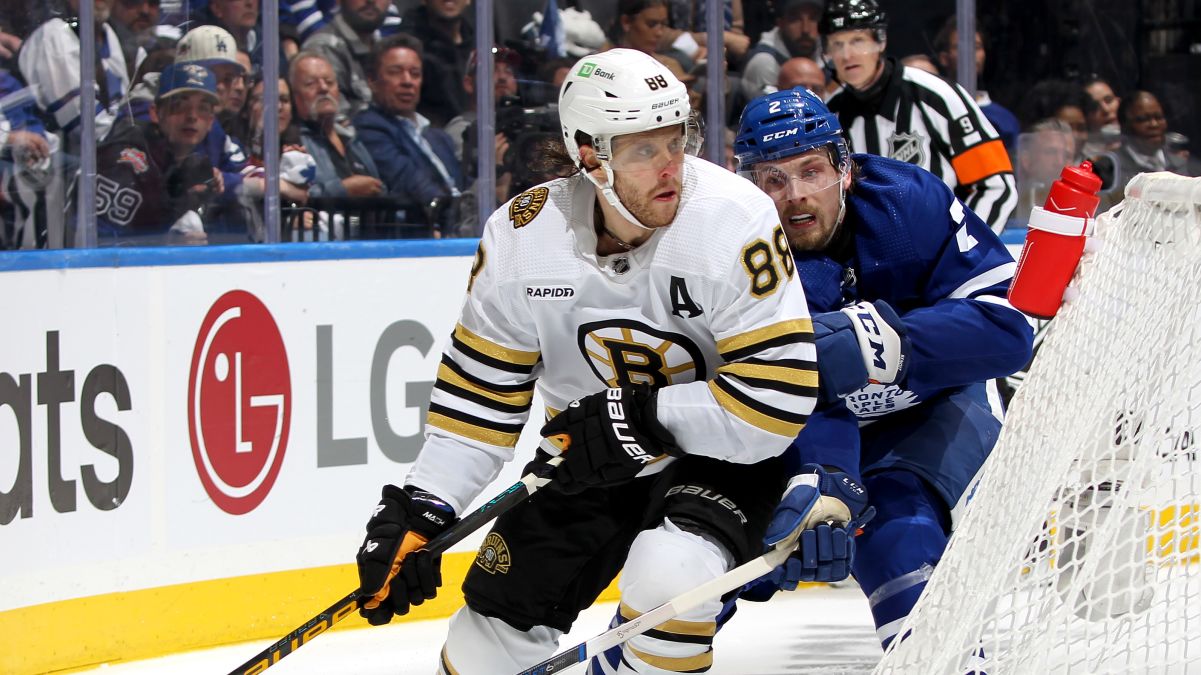
The army came to his home looking for him.
He was due to serve two years for his country and hadnt reported for duty.
Hes not here, his father told them. Hes in Canada playing hockey.
Zdeno Chara was gone. Gone from his family, his friends, and his country to pursue a dream that would, years later, lead him back with the Stanley Cup.
---
Chara got a late start on the game by hockey standards. It wasnt until his neighbor, a Zamboni driver at a local rink, asked his father if he would like to play that the six year old slipped on a pair of skates.
He entered the building in Trencin, Czechoslovakia through a side entrance and saw a single light shining down on the ice. Then, it hit him.
Boston Bruins
I just remember that smell, he recalled to CSNNE.com. The smell of the ice.
With an empty rink in front of him, he tried to dash out onto the ice.
As soon as I stepped on, boom! I wiped out on my back, he said with a laugh. But it was great. The first memory always stays with me.
Athletics were in the genes of the now six-foot-nine-inch Boston Bruins defenseman. His father, Zdenek, was an Olympic wrestler and his mother, Veronica, had played volleyball. Zdenek never wanted his son to follow in his footsteps -- the sport had taken a toll on his own body -- and his son was ok with that.
Chara was intrigued by hockey, all the equipment he got to use, and the fact that when he fell wearing padding, it didnt hurt. He started off by hanging on to the boards while his teammates skated freely around him and eventually caught up.
The hockey program in Czechoslovakia was sponsored by the government, which operated in a communist system until Chara was a teenager. The players received most of their gear from the age group ahead of them each year they advanced, and their families were responsible for any repairs to maintain the equipment.
At the time, Chara realized the system was strict but considered it to be a normal way of life. He didnt know any other option.
It was Czechoslovakia back then, he explained. It was normal. We were just raised in a way that any other family was. We were not a wealthy family but we were not a poor family, a nice middle class. Both of my parents had decent jobs, I went to school, played with all the kids on our block, and we had a lot of fun.
It was different, which we found out later on. Growing up under a communist system was a little bit different from other countries, but we didnt know any better. We were just basically born in that regime and we were just basically thinking its probably a normal thing.
He continued, It was really strict. You were not allowed to say anything bad and you were not free to express your opinions toward the government or the system or the regime. You just basically had to follow with the rules, and if you didnt people went to jail or they were stripped from their jobs or released from their jobs. It was just one of those things. On certain days you had to dress up in uniforms. You went to school and any time the teacher came into class you had to stand up and say good morning.
It was a couple things like that that you really had to be under awareness, but in a certain aspect of that whole regime, it made you really be good as far as discipline and being responsible for what you say. In a way it was good. In some other ways, it was not so good.
When the communist regime ended, Chara noticed a change in society. Some people who had depended on jobs through the government became unemployed and struggled financially, while those who had previously lost land and property to the government reacquired their wealth. With that, the hockey program was impacted as well.
All these sports were sponsored by the government, he said. But once that whole regime fell, it was tough because all of a sudden these families with really talented kids drop from being middle class families to the bottom. They were not able to afford to buy skates, sticks, helmets. So a lot of these kids had to stop playing hockey and that was kind of a sad part because there were so many good and talented players.
Fortunately for Chara, he was old enough at the time that his family was able the pay for the remainder of his hockey activities. Zdenek worked as a prison guard protecting the medical staff and Veronica was a hairstylist. Together, they supported their sons pursuit, even when others didnt agree on his potential.
After growing frustrated with his role on his team at home, Chara left Slovakia (which had separated from Czechoslovakia) for the Czech Republic to play hockey for Sparta Praha in Prague.
I wasnt supposed to make it, he said. I was always on the other side of the fence where maybe I was the fourth line and the eighth, ninth, tenth defenseman. I had to overcome a lot of adversity, and thats why I left Slovakiabecause the coaches didnt believe I could be a hockey player. I didnt like that so I went to Czech Republic.
With eyes on the NHL, Chara made plans to go to Canada to continue playing hockey for the Prince George Cougars. But before he could leave, he had to address an obligation far different than winning a game.
When I left at age 18, we had mandatory army service in Slovakia, he explained. Before I left, they call you in and go through the medicals and check you in and if youre ok, you serve the country and all that. That was sort of part of the old regime, and for two years you had to be in the service.
Every day you got up, dressed in a uniform, and did a whole bunch of stuff. You didnt do anything. It was like a prison. You were closed in. You had maybe once a month you could go home for a couple days and then return. So to me, I knew if I would stay and serve the army, I wouldnt be able to play hockey.
There were actually some cities where you could go serve the country but play hockey as well, but they could only get a few guys to play for that team, usually guys who had rich parents and had money for their kids to stay. Obviously my family couldnt afford that and they didnt want to do that for that purpose too. So I decided to leave.
Once in Canada, Chara quickly realized if he wanted to pursue a career, he could not return home. He was not the only player to leave Slovakia before his service time and he learned what happened to those who went back.
These guys who went with me, they couldnt be, maybe, strong enough so they went back home, he recalled. As soon as they went back home and crossed the border, boom, they got arrested and then straight to the service. So as soon as I heard that I was like, I cant go back home."
Charas only option was to make it in Canada. That meant both on and off the ice.
Once the hockey season (and the paychecks) ended, he began looking for work so he could send money back to his family in Europe. He had made connections in the community and knew a few people who could help him with under-the-table jobs.
The arms that lifted the Stanley Cup last season gained experience pushing wheelbarrows and scrubbing the dirt off filthy cars.
I realized that I have to be really responsible and accountable for what I do, Chara said. In the summer I had two jobs so I could support the family. My one job was landscaping and other job was I working at a carwash in Prince George. I washed cars by hand.I was digging holes, I did everything. It was a lot of hard work. I tried to fit in at least one or two workouts a day and I was really tired.
Chara embraced the opportunity to work. Complaining about the long hours while juggling a hockey career was not part of his mentality. He grew up in a household where his father enforced a strong work ethichelp out at home and then you can play with your friends. Priorities were in order.
Hard work manual work was not strange to me or something different, he said. A lot of the family houses had big lots and landscaping was part of it. We had a lot of home animals, like chickens, rabbits, pigs, whatever we could to support feeding the family. Thats what my parents did. Everybody did that. We did whatever it took to put food on the table. For us, cutting trees, planting, or doing anything to have potatoes, tomatoes, whatever, fruit, that was pretty normal, like everyday work.
Within a few years, hockey became everyday work for Chara. He was selected by the New York Islanders in the 1996 NHL Entry Draft, and went on to play for the Ottawa Senators before joining the Bruins in 2006.
Chara recalled the day he received a phone call from Slovakia while he was still working to establish a place for himself in the NHL. The coach of the national team wanted him to play in the World Championships.
Chara was excitedunder one condition.
I told the coach, Listen, I have no problem. Ill go but you guys have to make sure my papers are ok, he said. Ill go but under one circumstance, and thats Im not going to be arrested and Ill be free to go back to Canada. Thats what happened. We made a deal and that was it.
Chara returned to Europe for the games and has many times since then, including a recent trip with the Stanley Cup over the summer. The country is different now than when he left. Eventually the Slovakian government phased out their mandatory army service and operates on a voluntary basis. The impending alternative that awaited him back home no longer exists.
If I didnt go (to Canada), I would have been working in the army and I would be serving almost two years, he reflected. Usually after that its so hard to even find a job because you just have nothing. You finish high school, you serve two years in the army, and then what do you do? You just come out and you have to go back to school and try to go for some degree in college or university, or you just find some job and you just work, and thats it.
I was lucky.
Chara left his home in Slovakia years ago to chase a career, unsure if he would ever be able to return. Now he can go back any time he wants with an accomplished dream -- and championship -- in tow.


